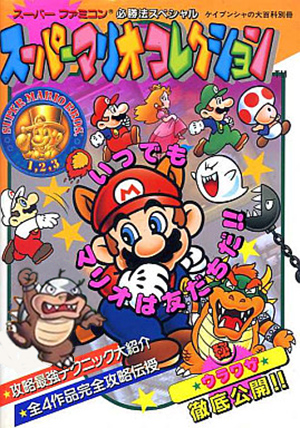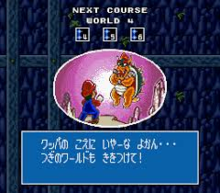BS Super Mario Collection

| |
| BS Super Mario Collection | |
| Developer | Nintendo EAD |
|---|---|
| Publisher | Nintendo |
| Platforms | Super Famicom, Satellaview |
| Released | Week 1: December 28, 1997 Week 2: January 4, 1998 Week 3: January 11, 1998 Week 4: January 18, 1998 |
| Added to Museum |
Not yet |
BS Super Mario Collection (BSスーパーマリオコレクション) was a modified, partial release of Super Mario Collection, the compilation known outside of Japan as Super Mario All-Stars.
It included five worlds from Super Mario Bros., six worlds from Super Mario Bros. 3, and five worlds from Super Mario Bros. 2, the latter of which was known as The Lost Levels outside of Japan. Super Mario Bros. and Super Mario Bros. 2 now included a world map based on Super Mario Bros. 3.
BS Super Mario Collection was the companion game to BS Super Mario USA Power Challenge. The latter was a game that acted as the sequel to, and included several worlds from, Super Mario USA, the game known as Super Mario Bros. 2 outside of Japan.
Story
An Italian plumber named Mario has to travel across several worlds within the Mushroom Kingdom and collect power-ups to defeat enemies standing in his way, on his quest to rescue Princess Peach from King Koopa.
On his first quest, Mario must travel across five worlds until he can ultimately defeat King Koopa in his fortress. In this quest, he has access to power-ups that allow him to grow in size, shoot fireballs, or become invincible for a short amount of time.
On his second and third quest, he has to travel across three worlds each. To do so, he is given access to additional power-ups which allow him to perform actions such as flying for a short amount of time or swimming more effectively.
Finally, he has to travel across five more worlds, once again only having access to the power-ups available on his first quest. However, this time he has to contend with a poisonous item that will shrink or kill him if he consumes it.
Differences from Super Mario Collection
- Only worlds 1 through 5 were included from Super Mario Bros. (on day one).
- Only worlds 1 through 5 were included from Super Mario Bros. 2 (on day four).
- Only worlds 1 through 6 were included from Super Mario Bros. 3 (three each on days two and three).
- Super Mario USA was not included due to the broadcast of BS Super Mario USA Power Challenge.
- The worlds that were included from Super Mario Bros. and Super Mario Bros. 2 now have a world map in the style of Super Mario Bros. 3.
- On the map, a fire flower icon represents Nae's house (なえのいえ). This house is hosted by a singer and actress named Nae Yūki, who was a personality on the "All Night Nippon" radio program at the time. In Nae's house, if Mario is small or is Super Mario, it is possible to activate ghost mode (おばけモード). This allows Mario to become Fire Mario once he exits the house. However, it also disables the ability to participate in rankings.
- A treasure ship icon is unlocked when Mario finishes all levels in a world.
- There are screens before each level that stating the level number, list all levels in that world, and display images of the characters which reveal the story of the game.
Release
BS Super Mario Collection was only released digitally, over the course of four weeks.
In addition to being only released digitally, the voice acting and music that accompanied the game were broadcast over satellite, so the game in its original form is no longer available.
Fans have made the digital files that have been saved by people who played the game in its original release playable in emulators. However, only week two has been saved, and fans have successfully extracted and made playable week three from the data inside week two. Week one and week four have not been recovered.
| Japanese Title | English Translation | Original release |
|---|---|---|
| 第1週 | Week 1 | December 28, 1997 |
| 第2週 | Week 2 | January 4, 1998 |
| 第3週 | Week 3 | January 11, 1998 |
| 第4週 | Week 4 | January 18, 1998 |
